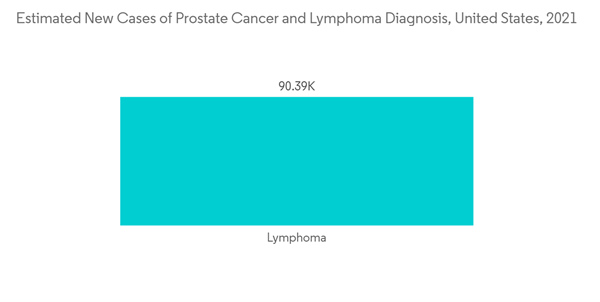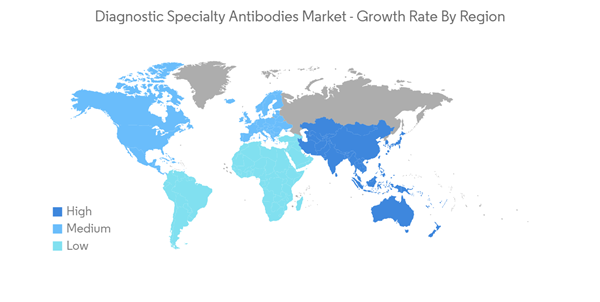The COVID-19 pandemic has had a substantial impact on the diagnostic specialty antibodies market. The usage of diagnostic antibodies underwent a significant rise during the pandemic as these antibodies were adopted quickly for the detection of COVID-19 during the pandemic. For instance, according to an article published by PubMed Central in February 2021, the main-stream diagnostic methods used during the pandemic to detect the presence of SARS-CoV-2 virus in the laboratory include nucleic acid PCR tests and direct viral antigen tests for detecting active infections, and indirect human antibody tests specific to SARS-CoV-2 to detect prior exposure. Furthermore, according to FDA in February 2022, SARS-CoV-2 antibody tests can help identify people who may have been infected with the SARS-CoV-2 virus or have recovered from COVID-19. But the antibody tests cannot be used to detect active COVID-19 infection. Currently, the usage of antibodies for COVID-19 testing lowered drastically as other tests like PCR and antigen tests have become much more popular due to the confirmatory results that they provide. Thus, the COVID-19 outbreak affected the market's growth favorably in its preliminary phase; however, during the forecast period, the market is likely to go back to how it was during the pre-pandemic phase.
The advancements in DNA-based technologies and diagnostics are expected to boost market growth. In addition, the high number of patient pools undergoing diagnosis of HIV and the growing demand for specialty diagnostics around the world are projected to fuel the market. Furthermore, the increase in the prevalence of diseases such as infectious diseases, influenza, and cancer is expected to boost the diagnostic antibodies market.
For instance, according to an article published by BMC in January 2022, immunohistochemistry (IHC) using monoclonal and polyclonal antibodies is a very useful and popular diagnostic method for detecting pathogen antigens in fixed tissues, it complements the direct diagnosis of infectious diseases by PCR and culture on fresh tissues. The article also stated that the immunohistochemical technique is a rapid and efficient way of identifying HIV antigens in fixed surgical and autopsy specimens. The immunohistochemistry technique using an anti-p24 monoclonal antibody has proven to be very useful for detecting HIV in lymph node biopsies of patients with unexplained follicular hyperplasia.
In addition, new key developments and strategic activities by major players in the market are positively affecting the growth of the studied market. For example, according to an article published by MDPI in April 2021, monoclonal antibodies are an emerging tool for cancer diagnosis, treatment and even delivering radiation or chemotherapy to targeted areas of the body. Recently, researchers have cloned a new anti-p16 antibody that may become a new valuable tool for pathological cancer diagnosis. Thus, owing to the product launches and partnerships, the studied market is expected to have significant growth over the forecast period.
However, the high cost of the development of antibodies in rapid diagnosis is expected to hamper the market growth.
Diagnostic Specialty Antibodies Market Trends
Monoclonal Antibodies are Expected to have Significant Growth Over the Forecast Period
Monoclonal antibodies play a vital role in the diagnosis of many infectious and chronic diseases such as cancer. The increase in the number of research activities on monoclonal antibodies and their applications in various disease diagnoses along with a growing number of cancer cases and increasing awareness regarding early diagnosis is expected to boost segment growth.For instance, according to an article published by the Biomedical Journal of Scientific & Technical Research in September 2020, monoclonal antibodies have prominent applications in diagnosis, so they are incorporated into diagnostic techniques (western immunoblotting, ELISA, immunofluorescence test, and immunohistochemistry) for the diagnosis of various diseases. Monoclonal antibodies in diagnostic tests are important for detecting an antigen or antibody against microbes. Monoclonal antibodies also play a significant role in the development of specific serologic reagents for antigens in limited amounts. They provide both highly specific and reproducible immunological assays for rapid and accurate diagnosis of different types of infectious diseases.
Furthermore, continuous product launches by major players in the market are positively affecting the growth of the segment. For instance, in October 2022, Roche announced the launch of Anti-PRAME (EPR 20330) Rabbit Monoclonal Primary Antibody to identify PRAME protein expression in tissue samples from patients with suspected melanoma. The PRAME (EPR20330) antibody is used as an aid to differentiate between benign and malignant lesions to help improve diagnostic decisions.
Therefore, the monoclonal antibodies segment is expected to witness significant growth over the forecast period due to the abovementioned factors.
North America is Projected to Have Significant Market Growth Over the Forecast Period
North America is projected to have a significant market share among the regions owing to the adaptation of various antibody diagnostics coupled with well-established healthcare infrastructure in the region. In addition, new product launches, high R&D investments, and the growing number of cancer cases are some of the factors that are fuelling the market growth in this region. Moreover, favorable government policies and increased funding from the government in cancer research are expected to bolster market growth.The high prevalence of cancer in the United States is one of the major factors for the growth of the market. For instance, according to the data by the American Cancer Society 2021, there will be an estimated 1.9 million new cancer cases diagnosed and 608,570 cancer deaths in the United States during 2021. Furthermore, according to the same source, an estimated 54,010 new cases of cancer of the oral cavity and pharynx (throat) will be diagnosed in the US and 10,850 people will die from the disease. Incidence rates were found to be more than twice as high in men as in women. Hence, the high prevalence of cancer in the country will lead to the usage of more diagnostic specialty antibodies for the oncology field, thus is is expected to boost the studied market.
Therefore, owing to the aforesaid factors, the growth of the studied market is anticipated in the North American region.
Diagnostic Specialty Antibodies Market Competitor Analysis
The diagnostic specialty antibodies market is fragmented in nature due to the presence of several companies operating globally as well as regionally. The competitive landscape includes an analysis of a few international as well as local companies which hold market shares and are well-known The key market players include F. Hoffmann-La Roche AG, Abcam plc, Bio-Rad Laboratories, Inc., Abbott Laboratories, Agilent Technologies, Inc., Creative Diagnostics, Thermo Fisher Scientific Inc., Becton, Dickinson and Company, Merck KGA, and Sartorius AG among others.Additional benefits of purchasing the report:
- The market estimate (ME) sheet in Excel format
- 3 months of analyst support
This product will be delivered within 2 business days.
Table of Contents
Companies Mentioned (Partial List)
A selection of companies mentioned in this report includes, but is not limited to:
- F. Hoffmann-La Roche AG
- Abcam plc
- Abbott Laboratories
- Bio-Rad Laboratories, Inc.
- Agilent Technologies, Inc.
- Creative Diagnostics
- Thermo Fisher Scientific Inc.
- Becton, Dickinson and Company
- Merck KGaA
- Sartorius AG










